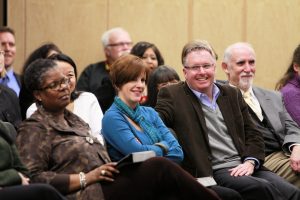Vollmer: Schools Cannot Do It Alone
When Jamie Vollmer graduated from high school in 1967 he was offered $3.83 an hour to work in a factory. Nobody even asked if he had so much as a high school diploma. It was an offer he couldn’t refuse, with wages higher than what career teachers were then earning in his Philadelphia school district.
Since then a lot has fundamentally changed. Just about everything, in fact, except our system of public education according to Vollmer, who spoke to a roomful of public school stakeholders on January 24 in the Boardroom at Central Campus and encouraged them to fan out in the community to launch what he calls The Great Conversation.
Vollmer’s perspective now is that of a former lawyer and CEO who was a harsh detractor of educators until a Road to Damascus epiphany converted him into a passionate advocate for schools, noted education consultant and author of the book, Schools Cannot Do It Alone.
Vollmer contends that we are at a unique intersection in history when the moral thing to do and the practical thing to do are one and the same; that being, teach all kids what we all need for them to know in the 21st century.
A big part of the challenge is to convince the 82% of Iowa taxpayers who don’t have kids in school that what’s good for the students is good for them too.
Vollmer coined the word “nostesia” to describe how most adults feel about public schools. “It’s 50% nostalgia and 50% amnesia,” he says. “‘Just teach ‘em the same thing I got; that’s all they need.’” No, says Vollmer, actually that’s not enough anymore.
He credits Thomas Jefferson with crafting the basic model of public schooling in America where everyone pitches in to educate the children. The problem is that Jefferson’s vision of a system that “rakes the genius from the rubbish” served us well enough as long as the times required only a small number of thinkers and legions of laborers. But that’s no longer the case. The industrial age has given way to an era of cognition where the three T’s of thinking, technology and teamwork trump the old-school three R’s.
When Vollmer was invited to join a roundtable of Iowa business leaders who sought to advise schools on what employers were looking for in graduates he brought three preconceptions with him to the process: (1) public education must change dramatically; (2) educators were the problem; and (3) schools would improve if they were run like businesses.
That was back in the mid-1980’s. Upon closer inspection of the problems he soon realized that numbers two and three were flat out wrong. Now he says “the system is the problem, not the people.” And as for running schools on a business model, he points out that public schools would be unique in the sense that they have zero control over the raw materials from which their finished products are fashioned. What’s known as “the blueberry story” (you can read it here) opened his eyes on that score.
Eventually Vollmer quit his job at the helm of an award-winning ice cream company and became Executive Director of the Iowa Business and Education Roundtable. He confidently asserts that business naturally gravitates to concentrated pools of skilled, well-educated human capital. Conversely, all sorts of social costs are incurred where schools are poor because now more than ever before “uneducated people will become desperate and desperate people are dangerous.”
“Vollmer’s List” of the countless additional tasks assigned to our schools since 1900 demonstrates the folly of expecting more with virtually no corresponding adjustment in the amount of time allotted to the task[s]. “Nostesia” keeps us “stuck in a system that was designed for a state and a country that no longer exist.” So how will the necessary change happen? Vollmer says there are four key ingredients:
- The community has to understand the challenges
- The community has to trust the schools
- The community has to give its permission for change
- The community has to support the changes that are made
To those ends Vollmer invokes the wisdom of Abraham Lincoln who observed that “public sentiment is everything. Whoever molds public sentiment carries the day.”
Which brings us back to The Great Conversation. Vollmer’s visit served as the kickoff for a new district initiative called the Strategic Issues Advisory Committee. If you are interested in participating there will be an organizational meeting on February 28. Details will be announced in the near future.





